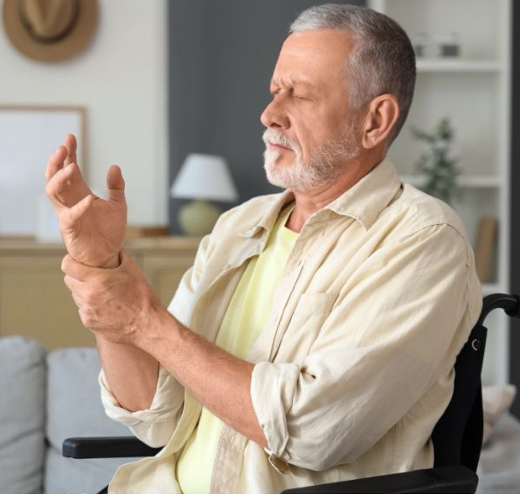
Parkinson’s disease (PD) is a progressive neurological disorder that primarily affects movement. It occurs when the brain cells responsible for producing dopamine (a neurotransmitter that helps control movement and coordination) start to degenerate.
It typically develops slowly over years, and its cause is still not fully understood. However, both genetic and environmental factors may contribute.
Signs and Symptoms of Parkinson’s Disease
Motor Symptoms (movement-related):
Tremor
Usually begins in one hand or limb, especially when resting (resting tremor)
Bradykinesia (slowness of movement)
Movements become slow and difficult to initiate
Muscle Rigidity
Stiffness in arms, legs, or trunk, leading to reduced range of motion
Postural Instability
Impaired balance and coordination, increased risk of falls
Shuffling Walk
Short, dragging steps and reduced arm swing
Facial Masking
Reduced facial expression; appears emotionless
Non-Motor Symptoms:
Depression and anxiety
Sleep disturbances
Fatigue
Memory and cognitive issues
Constipation
Loss of smell
Soft or low voice (hypophonia)
How Laughter Yoga Helps Parkinson’s Patients
Laughter Yoga, which combines voluntary laughter with yogic breathing, offers several therapeutic benefits for individuals with Parkinson’s disease:
1. Improves Facial Expression and Voice
Laughter exercises stimulate facial muscles, helping reduce "masked face"
Voice laughter exercises help improve vocal strength, volume, and clarity
2. Enhances Mood and Reduces Depression
Parkinson’s is often accompanied by depression and anxiety
Laughter increases dopamine, endorphins, and serotonin, lifting mood naturally
3. Boosts Mobility and Reduces Rigidity
Gentle laughter exercises involve rhythmic clapping, breathing, and body movement
Helps reduce stiffness and improve motor coordination
4. Improves Breathing and Posture
Yogic breathing enhances lung capacity, posture, and oxygen supply to the brain
May support better neurological function and energy levels
5. Enhances Social Interaction
Group laughter sessions reduce isolation and promote a sense of belonging
Builds community and emotional resilience
6. Reduces Stress and Cortisol
Chronic stress worsens Parkinson’s symptoms
Laughter Yoga is a powerful stress-reliever, lowering cortisol and relaxing the body


